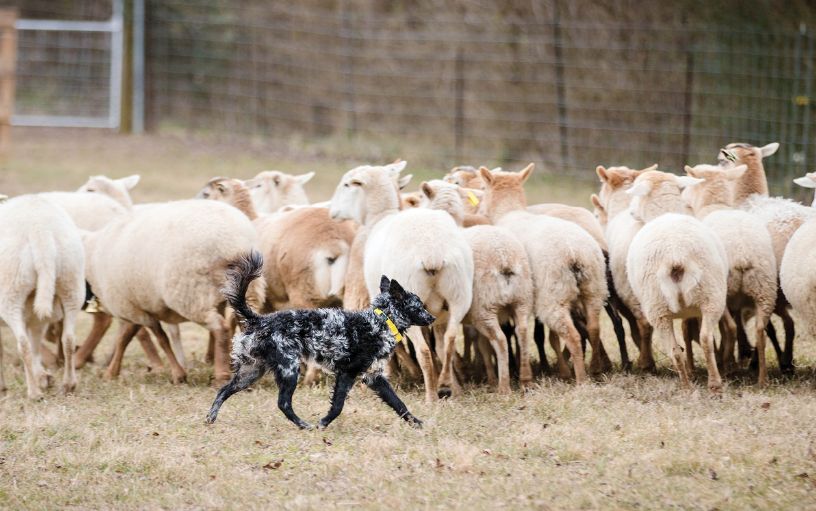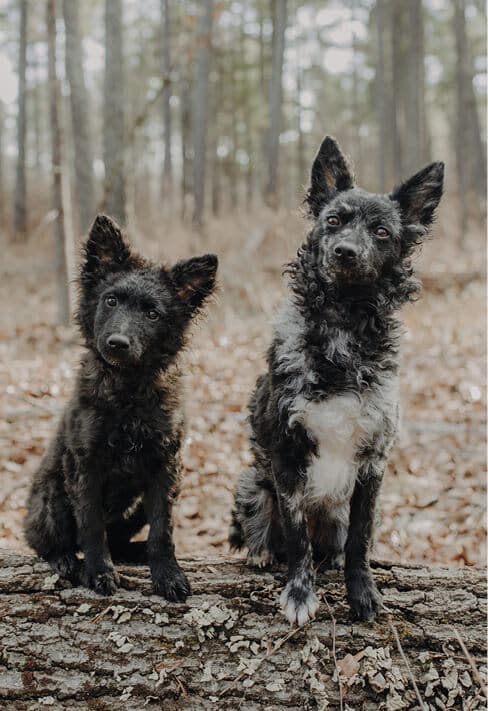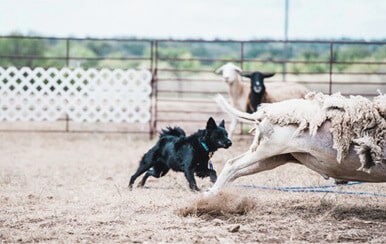
Home » Purebred Mudi | An Ideal Farm Partner

Purebred Mudi (Canis Ovilis Fényesi) – An Ideal Farm Partner
The Mudi (pronounced “moody”) is a medium-sized Herding Dog from Hungary that has been in existence since the 19th century. Today, the purebred Mudi, though very rare, is seen as an active, intelligent, biddable working breed. It is estimated there are no more than a few thousand purebred Mudi worldwide—and currently only about 300-400 live in the United States. Mudis excel at sports, including agility, obedience, disc, and dock diving. They are a true working breed, excel in herding both cattle and sheep, and have found fame as search and rescue dogs in both Finland and the US. Their herding style is upright and loose-eyed, and the breed does exceptionally well herding large flocks on difficult terrain.
Purebred Mudi come in both a tailed and naturally bobbed varieties. They are prick-eared—drop or tipped ears are unacceptable. Mudis are not large dogs, though their personalities would suggest so. The Mudi averages between 16-18″ at the withers, and typically weighs 20-28 pounds. Mudis are also relatively healthy and have a life expectancy of 12-14 years. This breed is known for their unique, curly coats. The level of curl varies between dogs and lines, but a Mudi can range from soft waves to tight, kinky curls. They do not have a Pumi or Poodle-type curl. The coat should be thick, and no part of the dog should be hairless or sparsely-furred.

Personally, I like to describe the purebred Mudi as 70% Herding Dog, 20% Terrier, and 10% Spitz. Their herding side is surely dominant, but the cheekiness and attitude of the Terrier will rear its head from time to time, and occasionally—when it suits her—the Mudi’s Spitz side will come out just long enough to give her handler “the middle finger” and keep doing what she wants.
A “day in the life” of one of my working Mudis typically begins with helping turn out the sheep, then keeping the flock at bay while the chickens are fed (sheep are naughty!). From there, the dogs assist in moving the sheep to whichever pasture they will spend their day grazing. If sheep need doctoring, foot trims, or other handling, the dogs help in sorting and catching. Mudi are brilliant thinkers and love a challenge, but can grow bored with repetition. They truly shine on a farm where chores change by the moment. Trainers must keep sessions short and lively, with high rates of reinforcement. Mudis love movement and are excellent problem-solvers, and can often intuit what their owners want before the owner even has a chance to ask.
It is important to keep in mind that the role of the purebred Mudi, historically, was to be an all-around farm helper and guardian. They have many qualities that make them an ideal farm partner. Mudi are inquisitive and observant, and are highly sensitive to changes in their environment. They are alert barkers and always will be—but they should happily accept a stranger when given the “A-OK.” Mudi are brave, and will not hesitate to charge into a situation if they feel their assistance is needed. The Mudi is your typical “wash & wear” herding dog. Some Mudi are light, seasonal shedders while others may shed more heavily. (In the case of a heavy shedder, more regular brushing may be necessary.) They have a hardy, dirt-repelling coat that typically does not mat or cord. At most, the Mudi shouldreceive monthly bathing and be air-dried, never blown, then combed sparingly if tangles are present. Typically, after a long day of work, my dogs submerge themselves in the water troughs and that’s enough to have them squeaky-clean by the time they’re back on the couch for the evening.

Like many Herding breeds, Mudi can be fearful and reactive if not properly socialized at a very young age. Additionally, some lines can be more fearful than others. These dogs can struggle to accept strangers in their environment, and display fearful aggression with other dogs. Also, like most Herding and Working breeds, Mudi need regular, intense exercise—but they should have an “off switch” indoors and settle easily with training. Mudi are energy-efficient and do not tire easily, and they recharge quickly. This breed is highly regarded for its speed, agility, and intelligence. If left to their own devices, Mudi can easily slide into their classic niche: the high-alert farm dog, ready to charge into battle at a moment’s notice. Careful socialization, training neutral responses, and desensitization to the environment are critical for young Mudi to become appropriately social dogs.
The purebred Mudi may not be the ideal working dog for all situations, but for those looking for a smaller, scrappy dog that can work hard on and off the farm, the Mudi may be a perfect match! You can contact the Mudi Club of America to meet Mudis and breeders in your area.
Purebred Mudi (Canis Ovilis Fényesi) – An Ideal Farm Partner
By Heather Clarkson
MCA President
